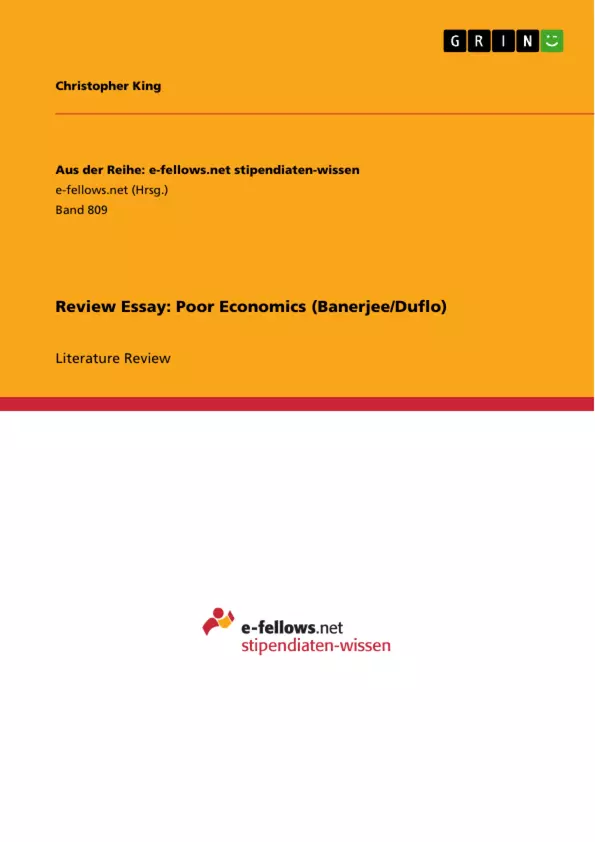“After all, we have spent billions of dollars on aid. […] Has it done any good? And sadly, we don’t know. And worst of all, we will never know.” (Duflo 2010, 01:37)
Poverty alleviation is a huge humanitarian challenge and also the supreme discipline of some economists. The effort to fight poverty had a mixed success so far and scholars claim different reasons for that outcome (cf. Besley 2012). In “Poor Economics”, Abhijit Banerjee and Esther Duflo avoid the often polemic ‘Sachs vs. Easterly’ aid debate and promise a “radical rethinking of the way to fight global poverty”: They make a convincing case about learning on the lives of the poor and the unique choices they have to face in their lives. Banerjee/Duflo understand how the poor perceive their conditions and come to the decision they make and are therefore able to craft better strategies and interventions that actually help the poor and do not produce unintended consequences. By doing that, they deliberately target the micro-level and leave out the level of politics or institutions, which is somewhat problematic, to search effective approaches in answers of the smaller questions.
This essay is structured in the following way: After an introduction to the analysis (2.) and an overview of Randomized Controlled Trials (RCTs), the main method of Banerjee/Duflo (2.1), the analysis will provide an assessment of key examples of the two scholars’ research (2.2). Subsequently, an evaluation of limitations (2.3) and shortcomings (2.4) of the book will be conducted. By evaluating the approach and findings of “Poor Economics”, the essay will be able to compare it with other scholarly works (3.). A conclusion (4.) will summarize the review and end with a personal take on what has been learned through studying the book.
Table of Contents
- Introduction
- Analysis
- Randomized Controlled Trials
- Key Examples
- Limitations
- Political Detachment
- Placement in Literature
- Conclusion
Objectives and Key Themes
This book, "Poor Economics," aims to provide a comprehensive understanding of the lives of the poor and their unique challenges. The authors, Banerjee and Duflo, propose a radical rethinking of the way to fight global poverty by emphasizing the importance of learning from the poor and developing effective, tested interventions to help them.
- The importance of understanding the decisions and challenges faced by the poor
- The role of randomized controlled trials (RCTs) in evaluating and improving interventions for poverty alleviation
- The impact of economic factors, including markets and institutions, on the lives of the poor
- The effectiveness of various micro-level interventions, such as health and education programs
- The limitations of RCTs in addressing larger systemic issues and institutional reforms
Chapter Summaries
The book explores various aspects of poverty through a combination of empirical research and insightful analysis. The authors delve into the private lives of the poor, highlighting their spending habits, decision-making processes, and the challenges they face in areas like health, education, and microfinance.
The first part of the book focuses on the individual choices and behaviors of the poor, examining their decisions regarding health, education, and family size. The authors present evidence from their research to show how these decisions can be influenced by factors like lack of information, time inconsistency, and limited access to resources.
In the second part, the authors explore the role of markets and institutions in shaping the lives of the poor. They analyze the potential of microfinance and other innovative solutions, while acknowledging the limitations of these interventions and challenging some commonly held assumptions about the poor as entrepreneurs.
Keywords
The book focuses on key concepts and themes such as poverty alleviation, micro-interventions, randomized controlled trials (RCTs), the lives of the poor, health and education, microfinance, and the limitations of economic approaches to poverty.
Frequently Asked Questions
What is the main goal of "Poor Economics"?
The book by Banerjee and Duflo aims to rethink poverty alleviation by understanding the specific decisions and micro-level challenges faced by the poor.
What are Randomized Controlled Trials (RCTs)?
RCTs are empirical methods used to evaluate the effectiveness of specific interventions, such as health or education programs, by comparing a test group with a control group.
How do the poor make economic decisions?
Decisions are often influenced by a lack of information, time inconsistency, and limited access to resources, rather than a lack of rationality.
What are the limitations of the "Poor Economics" approach?
The focus on the micro-level often ignores larger systemic issues, political institutions, and structural reforms necessary for long-term change.
Is microfinance an effective tool against poverty?
Banerjee and Duflo analyze microfinance as a potential solution but also highlight its limitations and challenge the assumption that all poor people are natural entrepreneurs.
- Citation du texte
- Christopher King (Auteur), 2013, Review Essay: Poor Economics (Banerjee/Duflo), Munich, GRIN Verlag, https://www.grin.com/document/262778



